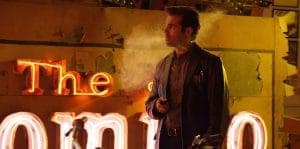
No, Clyde Cooper (Jordi Vilasuso) doesn’t moonlight as a costumed righter of wrongs, despite his alliterative name. Cooper is a detective, closer to the likes of Sam Spade than Sue Storm. As is often the case in film noir, Cooper works out of a hole-in-the-wall office, stashed away in one of those unassuming buildings that have a thousand others like it.
One day, a man walks into the office and starts yapping about some woman he’s in love with. He’s one of those flimsy guys who probably falls in love every time a woman smiles at him for too long. This woman has gone missing, and Clyde agrees to look for her. This sends him on a journey of chess-like interviews, barbed flirtations, and a lot of internal monologues. In other words, Clyde Cooper, written and directed by Peter Daskaloff, is a faithful throwback to the pulpy detective stories of old, with a small twist. As the opening of the film kindly informs us, the story takes place “sometime in the not too distant future.”

“…Clyde agrees to look for her. This sends him on a journey of chess-like interviews, barbed flirtations, and a lot of internal monologues.”
Once the story begins to unfold, this declaration quickly reveals itself as being completely useless. Because of the low budget, none of the locations Clyde visits look remotely futuristic. There’s a major plot revelation that does fit into a sci-fi mold, but when it’s revealed, the characters are shocked, just as they would be in 2018. That short bit of context that begins the film is ultimately for show and to announce the film’s intentions as being an acolyte of Blade Runner.
While it might initially seem petty to focus in on a meaningless bit of text, its showy inconsequence serves as a herald for the rest of the movie. The film often reminded me of a boy who slides his little feet into his father’s shoes, disappears into a sports coat and, like that, believes he’s achieved manhood. The movies that Clyde Cooper aspires to be are simply too ample in their style, wit and dramatic weight for its arms to reach the end of the sleeve. The dialogue is kitschy (“right in the middle of an ordinary life, love gives us fairy tale”), the plot is impotent, and Cooper’s brooding lacks the accompanying psychological unrest without which he just looks dense.

“…visually interesting use of a staircase in which every step doesn’t just look like a piano key, but plays like one, too.”
Only briefly does the movie ever hit the right nerve. One such example is a when Cooper rolls down a hill and onto a busy highway, at which point, a car inexplicably stops at the very last second. He stands up, notices the car is being driven by a pretty girl, quickly activates the charm and wryly says, “good brakes.” Sure, this self-aware mixture of danger and cheese would be better fitted to a Bond film than a film noir, but you take what you can get.
There’s also the fun, visually interesting use of a staircase in which every step doesn’t just look like a piano key, but plays like one, too. But even this interesting prop is underutilized. Imagine if two characters thought they were alone, only to hear the slow playing of notes—the plot would become the soundtrack, and vice-versa. Or imagine someone being thrown down the stairs and the garish, out-of-tune chords that would result. This is the problem with Clyde Cooper. All of its innovation stops at conception. It has ideas, but no follow-through.

Clyde Cooper (2018) Written and directed by Peter Daskaloff. Starring Jordi Vilasuso, Aria Sirvaitis, Isabella Racco, Richard Neil, Kristen Kelly, Tom Alper, Halasius Bradford, Alexandra Bokova, Alexander Aguila, Alicia Monet Caldwell, Anna Flinchbaugh, Brian Regal, Elijah Benjamin, Joanna Triantafyllidou, Abigail Titmuss, Franziska Schissler, Theresa June Tao, Lou Wagner.
4 out of 10 stars

